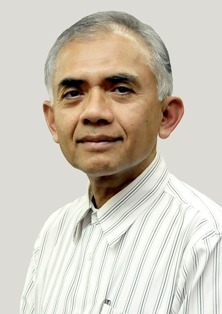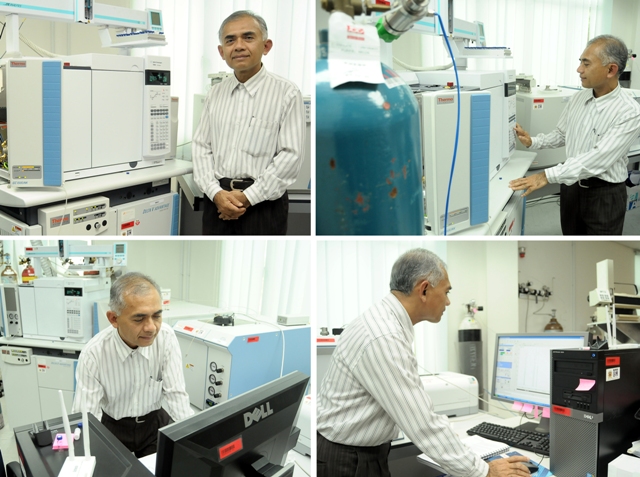PROF. BAHRUDDIN WANTS TO PUT DCC ON WORLD PEDESTAL

The new Director appointed to lead the Doping Control Centre (DCC), Professor Bahruddin Saad, intends to position DCC as the main referral centre in the world, always relevant, and set to immediately regain its accreditation suspended by the World Anti-Doping Agency (WADA). DCC’s accreditation was suspended because of failure to comply with the International Standards for Laboratory (ISL) which which received a reaction to various parties.
Concerted efforts are now made to regain accreditation to meet the needs of the country as well as reviewing the equipment available in the DCC laboratory to realise its immediate goal. This is all the more crucial since DCC has to analyse some 3,000 samples per year to meet the sampling requirements for its continuation.
One of the most urgent things to do is to correct the management by separating the tasks of DCC from that of Centre for Advanced Analytical Toxicology (CAATS).
According to experts in the field of Analytical Chemistry, the appointment comes with great responsibility and the challenge to drive excellence in DCC as an academic center that also offers consultancy services and to analyze a variety of samples, including air, urine, blood, and possible contamination of food.
According to the opinion of Kedah-born Prof. Bahruddin, trust mandated by the university required him to undertake the rigorous planning of DCC, an academic center that was considered a "luxury" with modern and the latest high-end laboratory facilities which was the envy of others.
“The question here is to determine how to optimise the use of the existing tools for all stakeholders including universities, the nation and global communities. These are the factors that I have carefully consider in starting my task,” he said.
He added that his efforts first focused on the process of developing the management structure of the organisation which is in accordance with our goals that some people perceive DCC as a centre that has expensive equipment, some of which is almost RM4 million per unit.
“The workforce is sufficient to carry out the work which needs to be done, aided by two deputy directors, one manager, two lecturers and a student at the post-graduate level, while also getting more commitment from the staff of 50 research officers, science officers, administrative officers, laboratory assistants, and others.
“DCC is expected to be a reference centre known regionally and globally. But to reach that level, there is still much work to be done because the process of obtaining trust and accreditation are not an easy task. It requires high commitment and passion to establish,” he said.
He added that, besides acting as a center that offers services and consultancy services to external parties, DCC also conducts courses at master's and doctorate (PhD) levels and to date there are more than 40 students who had attended the course by attachment at DCC.

PKD and CAATS
Elaborating further, he said that the role of DCC is much greater than just analysing urine or blood samples of athletes from around the world. DCC responsibility has now been expanded to provide other services that lead to stronger collaboration with bodies such as the Malaysia Health Ministry (MOH), Ministry of Agriculture, and agricultural-based and private agencies.
He said this is where the development of another unit under the DCC is known as the Centre for Advanced Analytical Toxicology (CAATS). CAATS acts as a unit that engaged in the analysis of all samples except for anti-doping. Some of the analysis performed under CAATS is on environmental pollution, food, and drug testing at a workplace.
Prof. Bahruddin said that DCC and CAATS are two totally different units, both in terms of staff expertise, facilities, and laboratories.
“For example, in the analysis of food contamination, CAATS be the reference laboratory for the MOH in conducting detailed analysis on the samples submitted, including complex samples that require high expertise because we, at CAATS, have the ability to meet that demand.
“We also tested the substances used in food industry, including tests on livestock and marine products that are for export to foreign countries to ensure that they are free from antibiotics, drugs or any chemical element forbidden under Food Security Act,” he said.
He also said that DCC only focuses on analysis of anti-doping activities. Currently there are over 100 substances that cannot be taken by an athlete and often the number of such substances increases over the years. Thus he said, DCC has to work hard to ensure the laboratory is aware of current developments and the standards outlined by the global accreditation body.
“We have to constantly upgrade their expertise and equipment. Many do not know the actual doping analysis is a subject that must be dynamic. Instrumentation used in the analysis should also be improved in accordance with the current requirements and they are relatively expensive,'' he added.
DCC SEEKING RE-ACCREDITATION
DCC’s credibility was slightly dented in mid-2010 when the international accreditation body of the World Anti-Doping Agency (WADA) suspended the accreditation of DCC on the grounds that it failed to comply with the International Standard for Laboratories (ISL).
The suspension also met with a reaction with various parties including, the latest, from the Youth and Sports Minister.
Not rattled by the matter, the Ph.D. graduate from the University of Wales, said that the common understanding of these things needs to be improved and at the same time efforts to improve the weaknesses are being executed, including providing a 'roadmap' to clarify directions for DCC.
“There are about 33 doping analysis laboratories worldwide and it is normal for an accreditation body to suspend or re-recognise a laboratory because the accreditation criteria are constantly changing according to current standards.
“USM is at the same level but are now in the process of re-accreditation and we have put in much effort into it, thus we dispel the idea that the people at DCC no longer carrying out any activity now,” he said.
He added that some of the efforts carried out at DCC are a programme called Internal Quality Assurance System (IQAS). IQAS is a system that allows DCC employees to perform a sample analysis according to the current specifications of accreditation bodies, including in obtaining samples, analysis, analysis result viewing, and problems.
“It is done like a proper analysis required by the accreditation body, providing the employees on their needs and current standards. In particular, DCC which also obtained ISO: 17025 was on the right track to regain accreditation and restore confidence in many of the laboratories,'' he said.
HOPE
Although new to this position in early January 2013, Prof. Bahruddin saw the potential and capabilities in DCC that can be mobilised to excel and be respected. He said he was hoping to reclaim WADA’s recognition for DCC as well as the expectations of the various parties in the country.
Furthermore, he said that accreditation is not the only hope for the center to lead. In fact, it is the objective of DCC to remain relevant indefinitely.
“To date DCC have contributed to the progress of the country, especially in analysis of food samples that are suspected to be poisonous and detrimental to the safety and well-being of the society in the country and the region. It is also involved in the analysis of various samples related to the melamine issue, hydrocarbons in food antibiotic use on farm animals, but it rarely gets much attention,” he said.
He added that DCC also welcomes anyone who wants to seek its services in particular analyses that can be done by CAATS. He said that DCC will consolidate its operations, including improving existing facilities to optimize its ability to explore bigger opportunities that could greatly benefit the development of knowledge locally, regionally and globally.
- Created on .
- Hits: 2317
